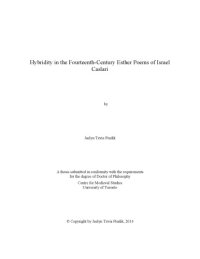
Ebook: Hybridity in the Fourteenth-century Esther Poems of Israel Caslari
Author: Jaclyn Tzvia Piudik
- Tags: Cultural translation, Hebrew literature, Judeo-Provencal, Medieval Jewish literature, Medieval Medicine, Romance
- Year: 2014
- Publisher: University of Toronto
- City: Toronto
- Language: English
- pdf
Hybridity in the Fourteenth-Century Esther Poems of Israel Caslari Jaclyn Tzvia Piudik Doctor of Philosophy Centre for Medieval Studies University of Toronto 2014 Abstract The Scroll of Esther, one of the quintessential texts of post-exilic Jewish salvation, was particularly beloved in the European Middle Ages, when the narrative served as a model for redemption from persecution and as a reminder of the threat of expulsion which was part of everyday Jewish life. Among its many medieval adaptations is a pair of texts written by Israel ben Joseph Caslari, a fourteenth-century Jewish physician, living in Papal-ruled Avignon. Israel's retellings of the Purim story are expanded and heavily embellished with material from talmudic and apocryphal sources, medieval medicine and philosophy, and references to popular culture. He composed his first version composed in JudÊo-Provençal, the southern French vernacular written in Hebrew characters; the second in Hebrew, not a translation, but an adaptation of its predecessor. As individual works, each is a rich intertextual landscape which offers a view into its socio-religious setting and reflects the meeting and melding of cultural influences. If one considers them together, this encounter becomes even more pronounced: the two versions come into conversation, embodying the tensions of their milieu, and of their author, a Jewish intellectual in a Christian-dominated society. The texts are a tapestry of ancient religious legacy and medieval thought, woven from threads of Jewish tradition and secular learning, from medieval belletristic conventions, midrashic literature and medical writings. This dissertation explores issues of biculturalism and religious identity through Israel's compositional strategies and his modifications to the biblical story. It considers first the notion of hybridity in the works through the convergence of their author's professional and religious concerns, in his treatment of gender and language as a representation of cultural boundaries and their transgression. It then examines the multiplicity of literary genres, both religious and secular, that inhabit and inform the texts, while engaging the question of their audiences as the Hebrew version prescribes.
Download the book Hybridity in the Fourteenth-century Esther Poems of Israel Caslari for free or read online
Continue reading on any device:

Last viewed books
Related books
{related-news}
Comments (0)